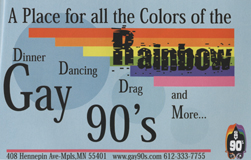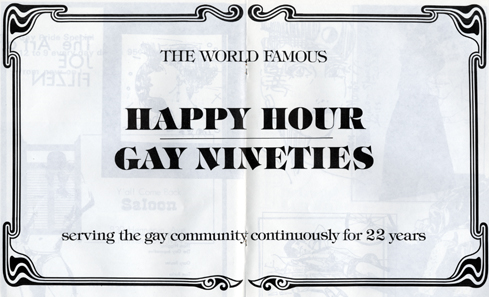Difference between revisions of "Gay 90s Complex"
(table +table) |
(table) |
||
| Line 15: | Line 15: | ||
[[Image:Svc_90s.jpg]] | [[Image:Svc_90s.jpg]] | ||
</div> <div style="text-align: center;"> | </div> <div style="text-align: center;"> | ||
| − | <small>'''2-page Gay 90s ad from the 1979 Twin Cities Pride Guide. Courtesy of the [[Jean-Nickolaus Tretter Collection]].'''</small> | + | <small>'''2-page Gay 90s ad from the 1979 Twin Cities Pride Guide. Courtesy of the [[Jean-Nickolaus Tretter Collection]].'''</small></div> |
| + | |} | ||
| + | {| {{prettytable}} | ||
| + | ! | ||
| + | ! | ||
| + | |- | ||
| + | | <div style="text-align: center;"> | ||
| + | [[Image:90s.jpg]] | ||
| + | </div> <div style="text-align: center;"> | ||
| + | <small>'''The Gay 90s when it was "straight." Courtesy of the Minnesota Historical Society.'''</small> | ||
</div> | </div> | ||
| − | | | + | | In the early morning of July of 1945, labor organizer Albert Schneider got into a brawl with another man and would up with a fatal gunshot wound—he died at the scene. This sort of activity garnered the Gateway’s negative reputation which, in turn, invited a queer underworld. |
| − | |||
Gay and bisexual men paradoxically patronized the Happy Hour first, in 1957. At the time, the Gay 90s was as a “straight” restaurant. The name did not initially imply queerness; it referred to a nickname for the 1890s—a “happy” period of economic growth in Minnesota. In fact, queer men took great care to avoid the attention of Gay 90s customers.<small>(1)</small> | Gay and bisexual men paradoxically patronized the Happy Hour first, in 1957. At the time, the Gay 90s was as a “straight” restaurant. The name did not initially imply queerness; it referred to a nickname for the 1890s—a “happy” period of economic growth in Minnesota. In fact, queer men took great care to avoid the attention of Gay 90s customers.<small>(1)</small> | ||
| + | |} | ||
| Line 34: | Line 43: | ||
|- | |- | ||
| Gay owners created a “shopping mall” upstairs in the 1980s, with gay stores such as [[Goliath’s Leather Emporium]], but the City quickly ended the unregulated venture. The mall was one of several impermanent ideas, among them the “90s Choice” beer brand—a micro-brewed house beer that donated ten cents per case to HIV/AIDS related charities in the early 1990s. These unsuccessful experiments are ultimately unimportant, for the Gay 90s remains an immensely popular and successful Twin Cities nightclub with something for everyone. | | Gay owners created a “shopping mall” upstairs in the 1980s, with gay stores such as [[Goliath’s Leather Emporium]], but the City quickly ended the unregulated venture. The mall was one of several impermanent ideas, among them the “90s Choice” beer brand—a micro-brewed house beer that donated ten cents per case to HIV/AIDS related charities in the early 1990s. These unsuccessful experiments are ultimately unimportant, for the Gay 90s remains an immensely popular and successful Twin Cities nightclub with something for everyone. | ||
| − | | [[Image:Svc_90s2.jpg]] | + | | [[Image:Svc_90s2.jpg]] Gay 90s ad from the 2002 Twin Cities Pride Guide. courtesy of the [[Jean-Nickolaus Tretter Collection]]. |
|} | |} | ||
Revision as of 18:13, 4 March 2010
408 Hennepin Avenue, Minneapolis
|
Minnesota’s most visible symbol of queer life is also one of the Gateway District’s few surviving buildings. A few of the 90s’ many bars, like the Happy Hour Bar or the Casablanca Lounge, remain as lasting testaments to the building’s pre-Stonewall history. For example, the Casablanca’s past is much darker than most realize. |
2-page Gay 90s ad from the 1979 Twin Cities Pride Guide. Courtesy of the Jean-Nickolaus Tretter Collection.
|
| The Gay 90s when it was "straight." Courtesy of the Minnesota Historical Society. |
In the early morning of July of 1945, labor organizer Albert Schneider got into a brawl with another man and would up with a fatal gunshot wound—he died at the scene. This sort of activity garnered the Gateway’s negative reputation which, in turn, invited a queer underworld.
|
“The 90s” began to take its current shape during the disco craze. The former restaurant/lounge was “renovated” (perhaps a generous term) and turned into a disco in 1976; a younger crowd of queer men instantly patronized the new night spot. Gay uses slowly overtook the entire building—beginning with the Happy Hour and Gay 90s, the “complex” added a Dance Annex and several theme bars and restaurants.
| Gay owners created a “shopping mall” upstairs in the 1980s, with gay stores such as Goliath’s Leather Emporium, but the City quickly ended the unregulated venture. The mall was one of several impermanent ideas, among them the “90s Choice” beer brand—a micro-brewed house beer that donated ten cents per case to HIV/AIDS related charities in the early 1990s. These unsuccessful experiments are ultimately unimportant, for the Gay 90s remains an immensely popular and successful Twin Cities nightclub with something for everyone. |  Gay 90s ad from the 2002 Twin Cities Pride Guide. courtesy of the Jean-Nickolaus Tretter Collection. Gay 90s ad from the 2002 Twin Cities Pride Guide. courtesy of the Jean-Nickolaus Tretter Collection.
|
(1)Tretter, Jean-Nickolaus. Interview with the author, 2/23/10 This page is still under construction. -SVC
Part of Minneapolis/St. Paul, MN: 100 Queer Places in Minnesota History, (1860-1969), (1969-2010)

